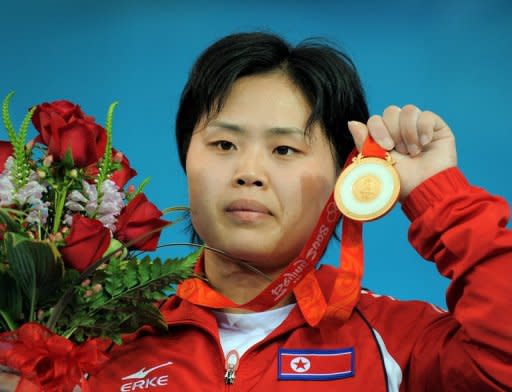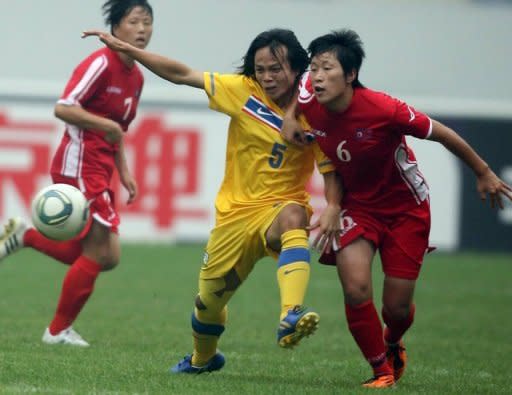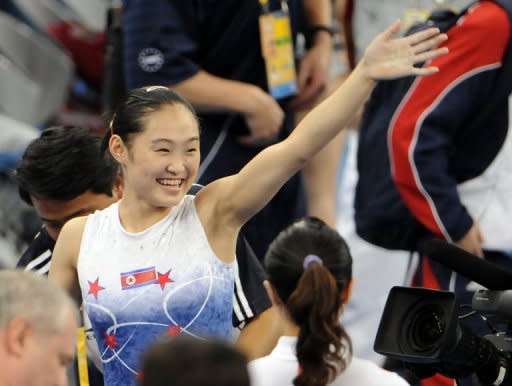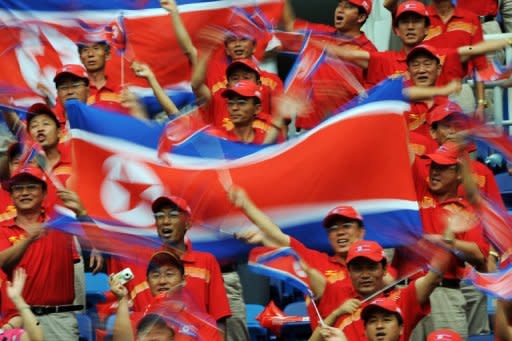'Dear respected' Kim inspires N.Koreans
He lacks the toned physique of an Olympian but "dear respected" leader Kim Jong-Un will be the inspiration when North Korea's athletes go for gold at the London Olympics. North Korea are aiming for a record number of medals in London in what would be a timely boost for Kim, the new face of the country's ruling dynasty and its all-pervasive personality cult. The portly young man in his late twenties is just months into his reign after the death of his father Kim Jong-Il, the guiding light for the North's athletes at previous Games. When Pak Hyon-Suk clinched women's weightlifting gold at the 2008 Beijing Olympics, she heaped praise on Kim Jong-Il, who was known as the "Dear Leader" or "Dear General". "I just kept it in my head that my Dear General's eyes would be watching over me, and that encouraged me to lift this weight," said Pak. "I am overjoyed by the fact that I have brought great joy to our Dear Leader." Pyongyang announced in early June that 51 athletes had qualified in 11 sports for London, with its main medal hopes in weightlifting, wrestling and women's football. At Beijing in 2008 the North won two gold, one silver and three bronze medals to finish in 34th place overall -- below its best showing of four golds among nine medals at Barcelona 1992. Little is known about the sporting tastes of the younger Kim, often tagged "dear respected" in state media, apart from a reported passion for American basketball during his school years. But the talents of his father, who died in December, were such that he famously carded five holes in one in his first round of golf, according to official media. At the 2003 University Games in South Korea, a troupe of North Korean cheerleaders wept uncontrollably when they saw a poster of the Dear Leader getting wet in the rain. And at the Beijing Olympics, South Korean athletes were under strict instructions not to point or laugh at badges or portraits depicting Kim Jong-Il. During the Olympics, attention often focuses on the North's decision to march, or not, in tandem with South Korea at the opening ceremony. In a rough barometer of political relations, the two Koreas marched together in 2000 and 2004 but could not reach agreement in 2008. Relations are currently at their frostiest for years and there has been no discussion at all about a joint march in London. Several other incidents involving North Korea have gone down in sporting lore. In June last year, football coach Kim Kwang-Min blamed a 2-0 women's World Cup loss to the United States partly on a pre-tournament lightning strike which was said to have hit several players. The following month, there was another bolt from the blue -- football's governing body FIFA said five members of the team had tested positive for banned anabolic steroids. The Koreans claimed the steroids came from a Chinese remedy, which includes an extract from the gland of the musk deer, and was given to the players hit by lightning. But FIFA banned North Korea from the 2015 women's World Cup. Men's football provided North Korea with arguably their finest moment, when they shocked mighty Italy 1-0 to reach the World Cup quarter-finals in 1966. But there were ugly scenes in 2005, when the Pyongyang crowd threw rocks and bottles at the Syrian referee during a World Cup qualifying loss against Iran. In April 2009 the North accused arch-rivals South Korea of poisoning the food of its players who lost a World Cup qualifier in Seoul. And last November, a 1-0 victory in a qualifier over former colonial ruler Japan was seen as sweet revenge for past injuries -- and a chance to humiliate the visiting team. Only 150 tickets were allocated to Japanese supporters, and players were held up for four hours at immigration. They were told off for laughing and had items such as bananas, chewing gum and instant noodles confiscated, Japanese media said. Before the game, deafening boos drowned out the Japanese national anthem in an intimidating atmosphere at Pyongyang's Kim Il-Sung Stadium, named after the current leader's grandfather. Pak Hyon-Suk of North Korea poses during the awarding ceremony for the women's 63kg weightlifting event at the 2008 Beijing Olympic Games. When Pak clinched the gold at the games, she heaped praise on Kim Jong-Il, who was known as the "Dear Leader" or "Dear General." Thailand's Kanjana Sung-ngoen (C) fights for the ball with North Korea's Yun Song-mi during a qualifier for the 2012 London Olympic Games, in Jinan, eastern China's Shandong province, in 2011. Pyongyang announced in early June that 51 athletes had qualified in 11 sports for London, with its main medal hopes in weightlifting, wrestling and women's football. North Korea's Un Jong-Hong waves to spectators after winning the gold in the women's vault final of the artistic gymnastics event of the Beijing 2008 Olympic Games. In Beijing, N.Korea won two gold, one silver and three bronze medals to finish in 34th place overall. North Korean fans cheer their team before the start of the women's 1st round football match against Germany at the 2008 Beijing Olympic Games.



